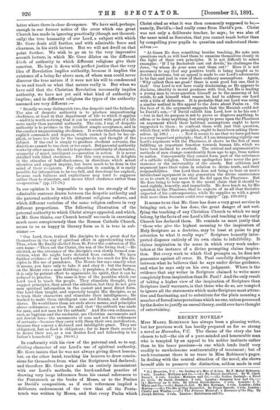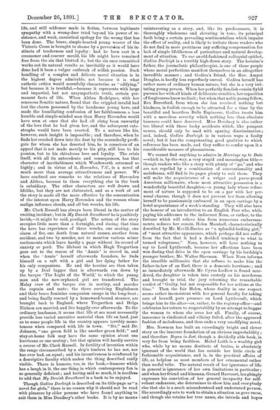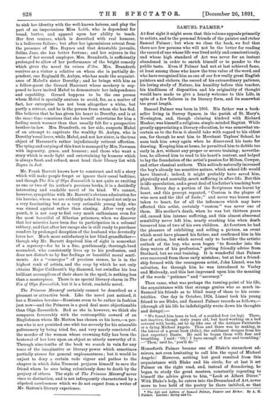RECENT NOVELS.*
Miss MABEL Ronibisoli has always been a pleasing writer, but her previous work has hardly prepared us for so strong a novel as Hovenden, V.C. The theme of the story she has chosen to tell—the sin of a pure-minded and honourable man who is tempted by an appeal to his nobler instincts rather than to his baser passions—is one which lends itself very readily to unwholesome sentimentality of treatment; but of such treatment there is no trace in Miss Robinson's pages. In dealing with the central situation of the novel, she shows herself able to preserve the distinction, seldom made in real " (1.) Nonenden, V .0 : the Destiny of a Man of Action. By F. Mabel Robinson. 3 vols. London : Methuen and 00.-12.) My Danish Sweetheart. By W. Clark Russell. 3 vols. London Methuen and Co.—(3.) Godiva Durleigh : a Novel for Girls. By Sarah Dondney. 3 vols. London : Sampson Low and Co.— (4.) Marriage up to Date. By Albert Kevill.Davies. 3 vols. London: F. V. White and Co.—(5.) Begun in Jest. By Mrs. Newman. 3 vols. London : John Murray.—(6.) The Sin of Olga Zassoulich. By Frank Barrett. 3 vols. London: Chatto and Windus.—(7) The Princess Mazaror: a Romance of the Day. By Joseph Hatton. 2 vols. London : Hutchinson and Co.
life, and still seldomer made in fiction, between legitimate sympathy with a wrong-doer tried beyond his power of re- sistance, and weak, casuistical apology for the wrong that has been done. The brave, simple-hearted young wearer of the Victoria Cross is brought to shame by a perversion of his in- stincts of tenderness and loyalty : had he been cast in a commoner and coarser mould, his life might have remained free from the sin that blotted it; but the sin once committed works out its natural results as inevitably as it would have done had it been a vulgar outbreak of selfish passion. Such handling of a complex and delicate moral situation is in the highest degree admirable, not because it is what msthetic critics would scornfully characterise as "edifying," but because it is truthful,—because it represents with large and impartial, but not unsympathetic truth, certain per- manent facts of life. When Althea Rodriguez, with her sensuous Semitic nature, found that the crippled invalid had lost the charm possessed by the handsome young hero, and made the humiliating confession of her faithlessness, a less humble and simple-minded man than Harry Hovenden would have seen at once that she had all along been unworthy of the love that he had given her, and the subsequent cata- strophe would have been averted. To a nature like his, however, such insight is impossible ; and therefore, when he finds her crushed down into the dust by the scoundrelly profli- gate for whom she has deserted him, he is conscious of an appeal that is not made merely to his pity, still less to his passion, but to his chivalrous love and loyalty. The crisis itself, with all its antecedents and consequences, has that character of inevitableness which Wordsworth esteemed so highly ; and in virtue of it, Hovenden, V.0., is a novel of much more than average attractiveness and power. We have confined our remarks to the relations of Hovenden and Althea, because to them everything else in the book is subsidiary. The other characters are well drawn and lifelike, but they are not elaborated, and as a work of art the story is made all the more effective by the concentration of the interest upon Harry Hovenden and the woman whose malign influence clouds, and all but wrecks, his life.
Mr. Clark Russell has always been liberal in the matter of exciting incident ; but in My Danish Sweetheart he is positively lavish,—it might be said, prodigal. The action of the story occupies little more than a fortnight, and during that time the hero has experience of three wrecks, one mutiny, one alarm of fire, one death from natural causes, another from accident, and two by murder, not to mention various minor excitements which leave hardly a page without its record of anxiety or peril. The lifeboat in which Hugh Tregarthen goes out to the rescue of the 'Annie' is stoved in, and when the 'Annie' herself afterwards founders, he finds himself on a raft with a girl and her dying father for his only companions. He and the heroine are then taken up by a Deal lugger that is afterwards run down by the barque The Light of the World,' to which the young man and the now-orphaned girl are transferred. The Malay crew of the barque rise in mutiny, and murder the captain and mate; the three surviving Englishmen and their brave feminine companion escape in the long-boat ; and being finally rescued by a homeward-bound steamer, are brought back to England, where Tregarthen and Helga Nielson are married, and live happily ever afterwards. To the ordinary landsman, it seems that life at sea must necessarily provide less varied narrative material than life on land, just as to some people life in the country appears terribly mono- tonous when compared with life in town. "Sir," said Dr. Johnson, "one green field is like another green field ;" and stay-at-home folk may have the same opinion about one hurricane or one mutiny ; but that opinion will hardly survive a course of Mr. Clark Russell. In fertility of invention within the range circumscribed by a ship's timbers he has not, nor has ever had, an equal ; and his inventiveness is reinforced by a descriptive faculty which makes the thing described really visible. There is humour, too, in the book,—humour which has a laugh in it, the one thing in which contemporary fun is so generally deficient ; and having said so much, it is needless to add that My Danish Sweetheart is a book to be enjoyed.
Though Galva Durleigh is described on its title-page as "a novel for girls," there is no reason why it should not be read with pleasure by older persons who have found anything to suit them in Miss Doudney's other books. It is by no means
uninteresting as a story, and, like its predecessors, it is thoroughly wholesome and elevating in tone, its principal fault being a certain pervading sentimentalism which impairs the effect of reality, and is likely to irritate those readers who do not find in mere prettiness any sufficing compensation for lack of simple lifelikeness of portraiture and natural develop- ment of situation. To use an old-fashioned colloquial epithet,. Godiva Durleigh is a terribly high-flown story. The heroine's father, the journalistic philanthropist, is one of those people whose moral perfections manifest themselves in an altogether incredible manner ; and Godiva's friend, the Rev. Amyot Douglas, is hardly less superfinely unreal. Godiva herself has rather more of ordinary human nature, but she is a very irri- tating young person. When her perfectly fiendish cousin Sybil pursues her with all kinds of deliberate cruelties, her capacities
of forgiveness know no limit ; but when that noble young fellow, Rex Beresford, from whom she has received nothing but kindness, is foolish enough to be attracted for a time by the beautiful and heartless Belle Espinasse, Godiva treats him with a merciless severity which nothing less than absolute baseness could have deserved. Miss Doudney is also rather too liberal with those lucky accidents which, like pungent sauces, should only be used with sparing discrimination ; and, indeed, Godiva Durleigh is in various ways a faulty novel; but it has the compensating good qualities to which reference has been made, and they suffice to confer upon it a considerable measure of pleasantness.
We cannot find anything to admire in Marriage up to Date —which is, by-the-way, a very stupid and meaningless title—
though readers who like a story with plenty of "go," and who.
are not repelled by a combination of conventionality and melodrama, will find in its pages plenty to suit them. They will make the acquaintance of a vulgar and purse-proud American millionaire, whose most attractive possession is a wonderfully beautiful daughter,—a young lady whose refine- ment of nature is supposed to be on a par with her per- sonal charms, though it does not prevent her from allowing herself to be passionately embraced in an open carriage by a hotel acquaintance of a week's standing. They will also have the honour of an introduction to an English Peer who, while paying his addresses to the indiscreet Nora, or rather, to the fortune which will relieve him from numerous embarrass- ments, seduces her cousin, Helen Marshall, characteristically described by Mr. Kevill-Davies as "a splendid-looking girl,' of "most attractive appearance, which perhaps did not suffer from the fact that it had a decided tendency to what is termed voluptuous." Nora, however, will have nothing to say to Lord Lyttlecraft, because her affections have been won during that drive in the open carriage by his lordship's younger brother, Mr. Walter Sherman. When Nora informs the irascible millionaire that she refuses to make him the father-in-law of an Earl, there is a domestic hurricane ; and as immediately afterwards Mr. Cyrus Ludlow is found mur- dered, the daughter is taken into custody as his murderess and brought to trial, the jury returning the remarkable verdict of "Guilty, but not responsible for her actions at the time." Then the fair Helen, whose frailty in one respect.
seems rather inconsistent with her general faculty for taking care of herself, puts pressure on Lord Lyttlecraft, which brings him to the altar—or, rather, to the registry-office—and celebrates her return to respectability by an attempt to beggar the woman to whom she owes her all. Finally, of course, innocence is vindicated and villainy foiled, after the approved fashion of melodrama, and thus ends a very unedifying novel.. Mrs. Newman has built an exceedingly bright and clever story on the insecure foundation of an obvious improbability ; and therefore Begun in Jest, though a decidedly able book, is very far from being faultless. Mabel Leith is a wealthy gir} who, while by no means destitute of brains, is absolutely ignorant of the world that lies outside her little circle of
fashionable acquaintance, and is, in the practical affairs or
life, as helpless as most members of her ornamental rather than useful tribe. The natural result of her ignorance of life in general is ignorance of her own limitations in particular ; and when her friend and kinsman, Gerard Harcourt, laughingly expresses his conviction.of her general incapacity for self- reliant endeavour, she determines to show him and everybody else that she is a much misunderstood and underrated person.
She accordingly sets to work to obtain a situation as gove mess, and though she retains her true name, she intends and hopes
to sink her identity with the well-known heiress, and play the part of an impecunious Miss Leith, who is dependent for bread, butter, and apparel upon her ability to teach. Her first venture, which is described with real humour, is a ludicrous failure ; but after her ignominious retreat from the presence of Mrs. Haynes and that detestable juvenile, Selina Jane, she has better fortune ; and her sojourn in the house of her second employer, Mrs. Brandreth, is sufficiently prolonged to allow of her performance of the bright comedy which gives the novel its raison Care. Mrs. Brandreth receives as a visitor a relative on whom she is partially de- pendent, one Reginald St. Aubyn, who has made the acquaint- ance of Mabel's sister Dorothy ; and he brings with him as a fellow-guest the Gerard Harcourt whose mockery is sup- posed to have incited Mabel to demonstrate her independence and capability. Gerard happens to be the one person whom Mabel is specially anxious to avoid, for, as a matter of fact, her enterprise has not been altogether a whim, but partly a retreat, and he is the person from whom she has fled. She believes that he has given his heart to Dorothy, and is at the same time conscious that she herself entertains for him a feeling much warmer than that usually felt for a prospective brother-in-law. Mrs. Brandreth, on her side, suspects Mabel of an attempt to captivate the wealthy St. Aubyn, who is Dorothy's real lover, while Mabel, and not her sister, is the true object of Harcourt's rather injudiciously reticent affection. The tying and untying of this knot is managed by Mrs. Newman with ingenuity, grace, and humour; and those who want a story which is made light and entertaining by humour which is always fresh and refined, must head their library list with Begun in Jest.
Mr. Frank Barrett knows how to construct and tell a story which will make people forget or ignore their usual bedtime, and though The Sin of Olga Zassoulich is not quite so exciting as one or two of its author's previous books, it is a decidedly interesting and readable novel of its kind. We cannot, however, sympathise with Mr. Barrett's obvious admiration for his heroine, whom we are evidently asked to regard not only as a very fascinating but as a very estimable young lady, who was sinned against rather than sinning. After very early youth, it is not easy to feel very much enthusiasm even for the most beautiful of Siberian prisoners, when we discover that her miseries have been due to participation in a colossal robbery, and that after her escape she is still ready to purchase comfort by prolonged deception of the husband who devotedly loves her. Much more satisfactory is her blind grandfather— though why Mr. Barrett deprived him of sight is somewhat of a mystery—for he is a fine, gentlemanly, thorough-bred scoundrel, who consistently lives up to his profession, and does not disturb us by fine feelings or beautiful moral senti- ments. As a " conveyor " of precious stones, he is in the highest rank of artists, and the coup by which he not only obtains Major Caldecott's big diamond, but swindles his less brilliant accomplices of their share in the spoil, is nothing less than a masterpiece. There is no special literary charm in The Sin of Olga Zassoulich, but it is a brisk, readable novel.
The Princess lifazaroff certainly cannot be described as a pleasant or attractive book. Like the novel just noticed, it has a Russian heroine—Russians seem to be rather in fashion just now—and the Princess is a good deal more objectionable than Olga Zassoulich. Bad as she is, however, we think she compares favourably with the contemptible coward of an Englishman whom Mr. Hatton has chosen as his hero,—a per- son who is not punished one whit too severely for his miserable poltroonery by being tried for, and very nearly convicted of, the murder of the woman whose crowning folly has been the bestowal of her love upon an object so utterly unworthy of it. Through nine-tenths of the book we search in vain for any trace of the imaginative or literary power which sometimes partially atones for general unpleasantness ; but it would be unjust to deny a certain rude vigour and pathos to the chapter in which John Tremont perjures himself to save the friend whom he sees being relentlessly done to death by the perjury of others. The style of The Princess Macro/ never rises to distinction, and is not infrequently characterised by a slipshod carelessness which we do not expect from a writer of Mr. Hatton's literary experience.




































 Previous page
Previous page